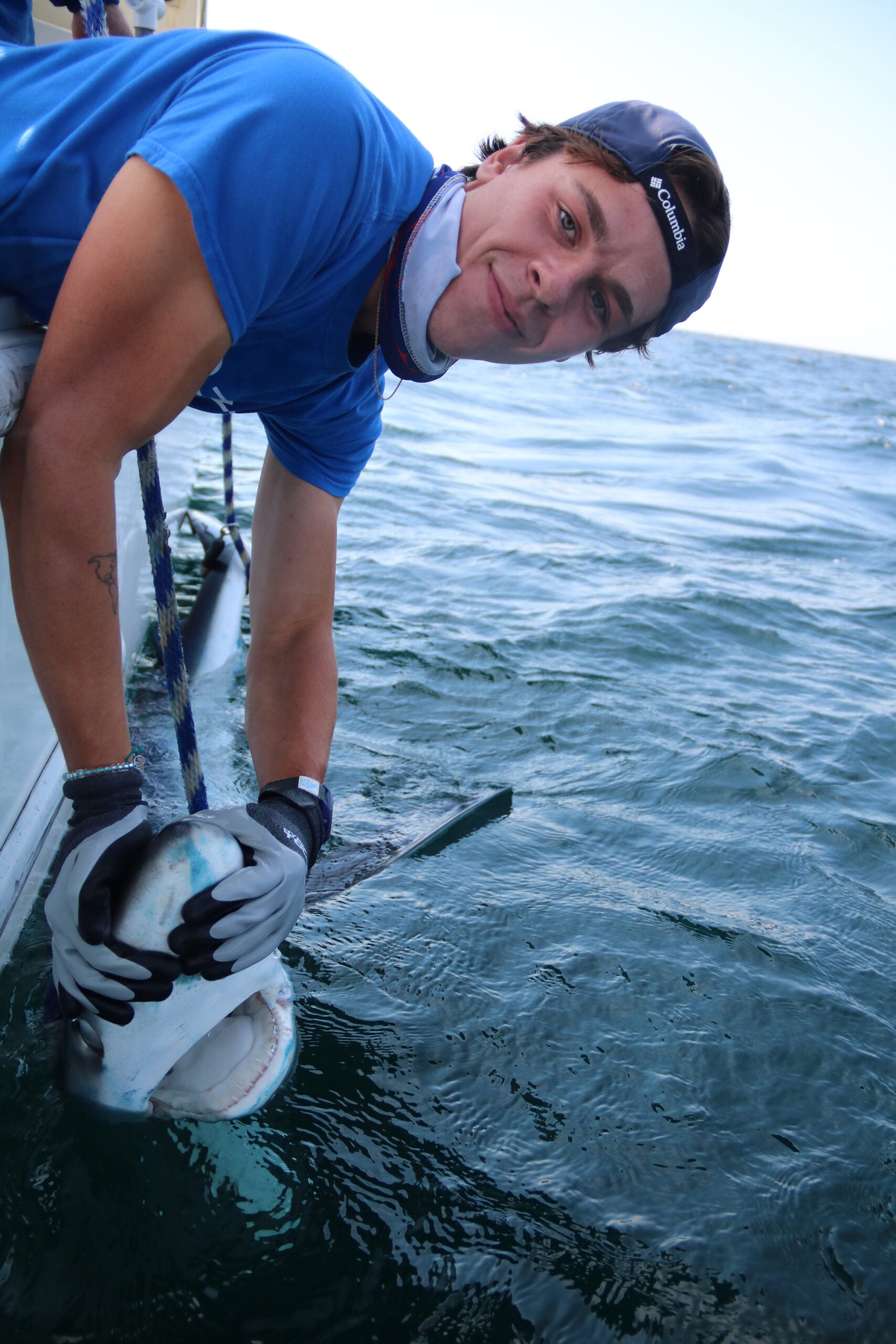KINGSTON, R.I. – September 18, 2020 – In just one year of collaborating with University of Rhode Island shark researcher Brad Wetherbee, senior Colby Kresge has become what Wetherbee calls “quite the shark wrangler” and a key player in his studies of mako sharks and stingrays.
Kresge, a resident of Montgomery, New York, joined Wetherbee on nearly a dozen trips off the Rhode Island coast in the last month seeking to capture and tag mako sharks in an effort to track their movement patterns. He also spent the summer reviewing videos of stingrays in the Cayman Islands to develop a photo-identification system for southern stingrays.
“The stingray project is essentially like a facial-recognition system,” said Kresge, an environmental science and management major. “They all have a unique pattern, like freckles on a face, so we take some of those unique features on their dorsal surface and pectoral fins and try to create matches. It’s worked with whale sharks and sea turtles, but nobody has ever tried it with southern stingrays. To be able to say that we’re doing something that nobody has ever done is exhilarating.”
The project will help to monitor the activity and whereabouts of individual rays in Stingray City, the world’s most popular tourist-wildlife interaction site.
Nearly every day during the summer, Kresge reviewed videos of stingrays provided by collaborators from the Guy Harvey Ocean Foundation, selected screen shots of individual rays, and loaded them into a software program that analyzes the image for unique identifying markers.
“We’ve had some really good success, though there’s still a lot of learning that takes place with it,” he said. “The software pulls out 35 unique points, and that’s usually enough to identify them. But we do see errors on younger males that don’t have as many distinct spots.”
The most exciting part of Kresge’s work with Wetherbee has been his shark fishing trips to their “secret spot” where they have captured at least one mako shark almost every trip. Makos are the fastest shark in the ocean and can grow to 14 feet long and 1,000 pounds. But their populations have declined precipitously in recent years due to overfishing.
“I grew up fishing in fresh water a lot, but the first time I had a mako on the rod it was unreal,” he said. “It’s a really good fight, but they get spooked by the boat, so when they get close they run out the line again. After doing that about three times, we can get it to the boat.”
Kresge and Wetherbee then quickly attach a satellite tracking device and release the shark back into the water.
“It makes me gain an appreciation for the animals because it’s helping us understand their natural patterns, where they migrate, how they interact with commercial fisheries,” said Kresge, who also works as a mate on a charter fishing boat. “One of the big misconceptions is that sharks are aggressive, devious creatures. But I can see their beauty and strength and realize that they’re just doing their own thing. We have no need to fear them.”
Kresge’s research is supported by the URI Coastal Fellows Program, a unique initiative designed to involve undergraduate students in addressing current environmental problems. Now in its 24th year, the program pairs students with a mentor and research staff to help them gain skills relevant to their academic major and future occupations.
His Coastal Fellowship and work with Wetherbee have him considering a new career path. Kresge had originally planned to work on land-based issues, perhaps for an engineering company on land development projects, but now he’s considering enrolling in graduate school and pursuing a career studying sharks and the marine environment.
“Dr. Wetherbee showed me there’s a whole other world out there in the water, so I want to keep learning about the marine aspect of this world,” he said. “I’d love to work with mako sharks as a career, because they deserve more attention. That would be unbelievably awesome.”

